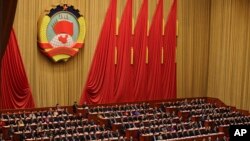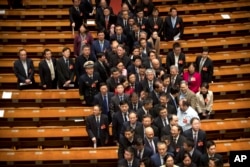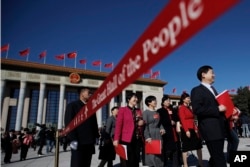China’s “two sessions” – the annual meetings of the national legislature and the top political advisory body – wrapped up their two week long discussion Friday, leaving little reason for observers to believe major policy issues had been thoroughly debated.
Instead, they said, most of the nearly 3,000 delegates of the National People’s Congress (NPC) and the Chinese People’s Political Consultative Conference (CPPCC) had been disempowered to challenge authorities.
“Clearly [Chinese President] Xi Jinping is under pressure and precisely because he’s under pressure, feeling slightly vulnerable, not terribly but slightly vulnerable. He’s just not going to allow anybody to say anything and who’s going to take the risk?” said Steve Tsang, director of the China Institute at SOAS University of London.
‘Dull and boring’
This year’s two sessions had turned out to be as “dull and boring” as he had anticipated two weeks ago, Tsang added.
State media reported that the NPC’s secretariat had received 491 proposals – 487 proposed legislations and 4 regulatory recommendations – to be handled by the top body.
In his work report delivered last March 8, Li Zhanshu, chairman of the NPC’s standing committee, pledged to move forward with revising urgently needed laws for deepening market-based reforms.
The top legislature would expedite legislation in the domains of public well-being, national security, intellectual property rights (IPRs) protection, social governance, and ecological advancement, enforce the principle of law-based taxation, and improve relevant laws on state institutions, he added.
Also, deliberation on the Civil Code, formulation of Amendment XI to Criminal Law and the laws on promotion of basic medical and health care, real-estate tax, export control and integrated military-civilian development are also on this year’s legislative plan, according to Li.
Constructive discussions?
In spite of the lengthy agenda, where had all those constructive discussions been? If they’re in public good, why aren’t they made public? Tsang asked.
The annual meetings are often seen as a carefully choreographed political show.
Things got even more tightly controlled this year.
Few of the supposedly highest parliamentary elite dared to speak up freely after Xi’s two-term limit was removed last year for him to consolidate his grip of power, said Xia Ming, professor of political science and global affairs at The City University of New York.
“[At times when Xi’s] personal cult and dictatorship consolidates in Chinese politics, not a single delegate dares to touch upon major [politically sensitive] matters. For these delegates, the political red zone has been largely widened to have put a squeeze on their freedom [of expression],” Xia said.
Sensitive ideas censored
Politically sensitive ideas or proposals, in particular, are censored.
For example, several of CPPCC delegate Zhu Zhengfu’s proposals, which urged authorities to be prudent on the practice of televised confessions, the adoption of unlawful evidence and the presence of lawyers during suspect interrogations, was removed from the Internet one day after they were circulated online.
The meetings had provided nothing but opportunities for Xi’s cronies to allow their flattery toward the top leader to go a long way, the New York-based professor added.
“These days, NPC and CPPCC [sessions] had clearly offered some political careerists a stage to put on a show – carefully choreographed and highly dramatic – so that they earn chances of promotion or grab more power. Their efforts are on public display,” Xia said.
Xia said that a meaningful exchange of democratic views are normally possible in small groups and plenty of delegates with integrity spoke freely in the face of past top leaders.
But since Xi has taken over, dissent has become rare.
Both Professor Tsang and Xia, however, agreed that China has put forward several significant pieces of legislation involving foreign investment and related issues such as intellectual property rights protection to help address its trade negotiations with the United States.
But it remains to be seen if the U.S. will be satisfied.
“That may well be what they [the Chinese] intend to do. But the Americans are not interested in them passing a law, the Americans are interested in the implementation of it,” Tsang said.
The more transparency, the better
Sharing a different view, Ren Jianming, director of the anti-corruption and governance research center at Tsinghua University in Beijing, argued that the function of the two sessions has gradually improved to no longer serve as a rubber stamp.
He, however, agreed that the top body should beef up its level of transparency by disclosing all proposals – good or bad, politically sensitive or not – for the public’s eyes since they’re in the interest of the general public.
“Once [all ideas] and their related discussions are made public, a better solution can be brainstormed and found. There’s no need to blacklist [dissenting views] and then leave them unsettled. That way, it may be even harder to find a solution to the problem,” Ren said.






